


F-Secure vs. Bitdefender, which is the best VPN provider? If you are in this dilemma, you have come to the right place. We have stripped down the two brands, detailing how they compare to determine the best option.
F-Secure and Bitdefender are household names in the cybersecurity industry. The two offer a wide range of security products, including antivirus software and VPN. In this comparison review, we are interested in their VPN services; F-Secure’s VPN, dubbed FREEDOME, and Bitdefender’s Bitdefender VPN. The two providers share quite a lot, but some differences should inform your purchase decision.
The difference between F-Secure FREEDOME and Bitdefender VPN is the supported devices, protocols, server network, and pricing. F-Secure FREEDOME works with PCs, mobile devices, and an F-Secure router, supports up to 7 devices, works with two protocols, and has a small server network. On the other hand, Bitdefender only works with PCs and mobile devices, supports up to 10 devices, works with just a single protocol, and has a wider server network.
Read along for more about how the two VPNs stack against each other.


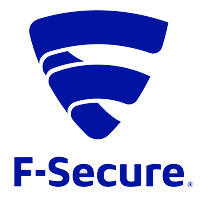
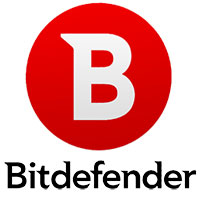
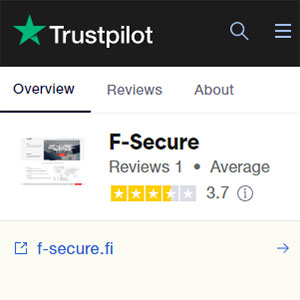
F-Secure is a Finnish company that develops a wide range of cybersecurity products, including an antivirus, password manager, and VPN. For this review, we have focused on its VPN dubbed F-Secure FREEDOME.
F-Secure was established in 1988 and has grown to become a market leader in cybersecurity. We wanted to know what users and experts think of this VPN, so we scoured VPN and cybersecurity forums.
Unfortunately, the VPN doesn’t have good reviews. From most of the reviews and opinions, FREEDOME Is a bit too basic compared to other top-rated VPN brands. A the time of writing, F-Secure has a Trustpilot rating of 2.1 after around 50 reviews which raises some questions regarding the reliability and performance of the VPN.
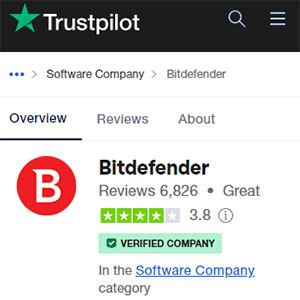
On the other hand, Bitdefender is a Romanian cybersecurity company founded in 2001. It is known for its range of cybersecurity products, including endpoint protection systems, cloud and managed security, antivirus software, IoT security, and VPN.
For this review, we will solely focus on the VPN marketed as Bitdefender VPN. We also did background checks to find out what consumers and exports say about Bitdefender VPN.
Unfortunately, just like FREEDOME, Bitdefender VPN is a basic VPN that can’t match the likes of ExpressVPN, Surfshark, NordVPN, and the rest. At the time of writing, Bitdefender has a Trustscore of 3.8/5 after over 6700 reviews on Trustpilot, which is at least better than F-Secure.
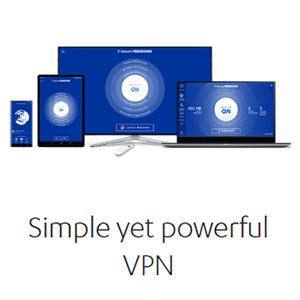
One of the major shortcomings of FREEDOME is the fact that it’s limited when it comes to supported devices. The VPN has apps for Windows and macOS PCs only. There are no apps for Linux or browser extensions.
FREEDOME is also compatible with Android and iOS mobile devices. It doesn’t work with Smart TVs, Fire Sticks, or gaming consoles. When it comes to routers, it is compatible with F-Secure SENSE routers only. Regarding the number of devices you can connect simultaneously, there are 2 options.
You can go for the plan that allows for 3 connections or 7. But if you have the F-Secure SENSE router connected, you can protect more devices by linking them via the protected router.
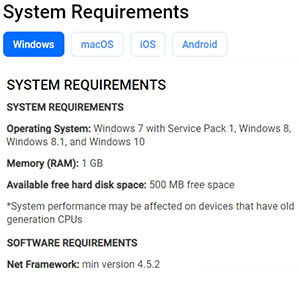
As for Bitdefender, there is also room for improvement as far as compatibility is concerned. The VPN works with macOS and Windows PCs only. There is no support for Linux and Ubuntu. The VPN lacks any browser extensions.
Bitdefender VPN also works with iOS and Android devices. Unfortunately, there is no support for routers, smart TVs, gaming consoles, and other devices.
When it comes to simultaneous connections, Bitdefender allows users to connect a maximum of 10 devices.
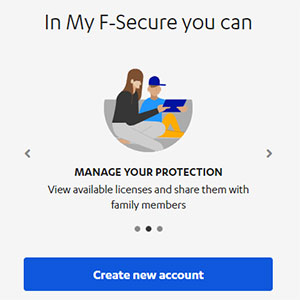
F-Secure has a rather tedious registration process. The first step is to click the Buy Now button, which redirects to the plans page.
Select a preferred plan and payment method on the plans page and enter your details, including your email address, first and last name, ZIP/Postal Code, and country. Then, check out and complete the order.
You will then have to create an account and activate it before downloading and installing the software. The app’s user interface is pretty straightforward, and so is the navigation.
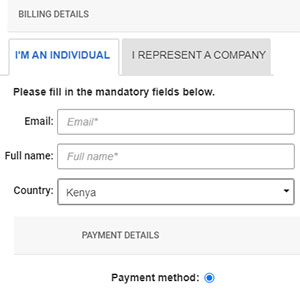
Bitdefender has the best usability compared to FREEDOME. The first step to getting started is clicking the Buy Now or Start Now button, which redirects to the plans page.
Here, select a preferred plan, enter your payment details, and checkout to complete the order. Now that you have a subscription, the next step is downloading the client software, installing it, and logging in.
Then, you are ready to go. Bitdefender VPN’s interface is clean, with less clutter and straightforward navigation and menu bars.
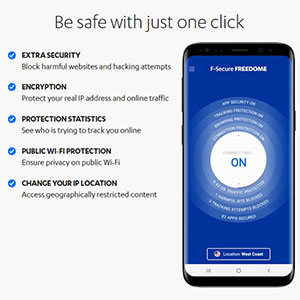
FREEDOME deploys both AES-128 encryption and AES 256-bit military-grade encryption. The latter is the most secure encryption technology today.
AES 256-bit is so secure that it would take the fastest supercomputers millions of years to penetrate data encrypted with AES 256-bit keys.
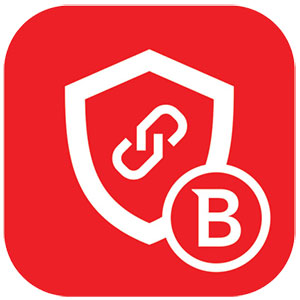
Bitdefender VPN is not different from FREEDOME in terms of encryption. It also deploys state-of-the-art 256-bit military-grade encryption to secure your data.
Data secured by Bitdefender VPN is impenetrable even when a brute-force attack is executed. Security is a notch higher courtesy of the RSA algorithm and SHA-256 hash functions.
Another shortcoming of FREEDOME is that it supports just two protocols; OpenVPN and IKEv1/IKEv2. OpenVPN, considered the most secure protocol, is supported on Windows, macOS, and Android.
On the other hand, IKEv1 is the default protocol for iOS, but you can switch to IKEv2.
Bitdefender is even worse in terms of protocols as it supports just one; Catapult Hydra. This is a tunneling method developed by AnchorFree, the venture behind Hotspot Shield.
It is a proprietary protocol engineered to offer fast speeds, just like NordVPN’s NordLynx or ExpressVPN’s Lightway, but it can’t match the performance of the NordVPN and ExpressVPN proprietary protocols.
Catapult Hydra deploys a proven Transport Layer Security (TLS) to establish secure client-to-server connections.
As mentioned earlier, FREEDOME is a basic VPN. It comes with a few security extras. While it has DNS Leak protection, the company clearly states that the VPN can’t prevent IP leaks through WebRTC, which is disappointing. The good thing is that a network kill switch drops the internet connection immediately after the VPN connection drops inadvertently, so you can be sure your traffic won’t leak when the VPN connection drops. FREEDOME also comes with a malware blocker that prevents access to malicious sites.
Bitdefender is dismal in terms of security extras. One security feature worth mentioning here is the internet kill switch that prevents your crucial data from leaking when the VPN connection drops. Split Tunneling lets you choose apps whose traffic should be routed via the VPN and vice versa. There’s also Auto Connect that springs the VPN into action when connected to public WiFis or when P2P sessions are launched.
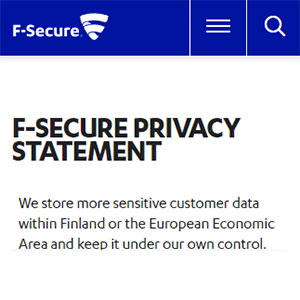
F-Secure is based in Finland, a country not part of any surveillance organizations, so it’s improbable that FREEDOME will share your information.
One great thing about Finland is that it’s a privacy-friendly jurisdiction that holds the 5th spot in the global internet privacy rankings with a score of 83.6.
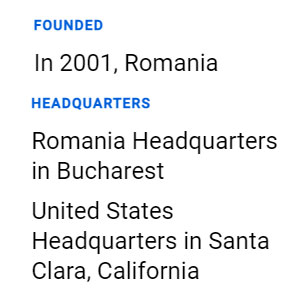
On the other hand, Bitdefender is based in Bulgaria, which is also not part of any global surveillance organizations.
Bulgaria is also a privacy-friendly country with a law that explicitly states that data processing should not affect the privacy of the personal life of its citizens.
FREEDOME VPN is not a no-log VPN, as it logs your VPN sessions, bandwidth, device ID, public IP address, and hostname. This should send chills down your spine now that the information logged can be used to track you.
The VPN also logs your browsing activity and checks all the URLs you visit though the URL logs are deleted after 3 days. To prevent your browser activity from being logged, it’s recommended that you switch off the Tracker Map feature.
On the other hand, Bitdefender is marketed as a no-log VPN, but it keeps some logs. The company’s privacy policy says it keeps logs of your IP address, timestamps, device ID, web information logs, and bandwidth.
As much as the company says all logs are encrypted, you should be wary of your privacy when using this VPN.
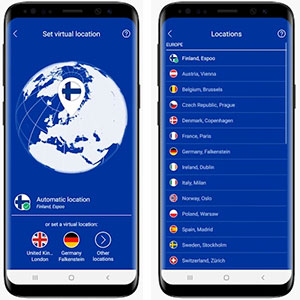
While it may be a renowned cybersecurity brand, F-Secure FREEDOME has a small server network. The company opiates around 28 servers in 22 countries which is dismal considering the top-of-the-range VPNs, including Bitdefender VPN, have thousands of servers. All the FREEDOME VPN servers are virtual servers; there are no physical servers. In addition, there are servers owned by F-Secure while others are rented. But we like the fact that the servers boast top-of-the-line hardware guaranteeing decent speeds and reliability. For the record, FREEDOME used to have its DNS IP address, but from the look of things, the company shifted to Cloudflare DNS servers.

Bitdefender excels when it comes to server network and distribution. It operates over 4,000 servers spread across 53 countries in Asia Pacific, the Americas, Europe, the Middle East, and Africa. There are physical servers alongside virtual servers, which the VPN shares with Hotspot Shield, another top-rated VPN. But unfortunately, there’s no way to know which are virtual servers and which ones are physical. But all the same, the servers have state-of-the-art hardware that offers decent speeds and reliability.

FREEDOME VPN may be a reliable VPN in terms of security, but there is a lot of room for improvement when it comes to streaming. In our tests, the service unblocked several Netflix libraries, including Netflix US, Canada, UK, and Japan. We also unblocked Amazon Prime Video, All 4, BBC iPlayer, and Disney+.
However, FREEDOME VPN doesn’t unblock Hulu, Disney+ (US/Canada), HBO Max, DAZN, and Amazon Prime Video (US). On torrenting, FREEDOME VPN is not reliable. The company states clearly in one of its FAQs that it has blocked P2P file sharing and torrenting.
Whenever P2P activity is detected, F-Secure temporarily blocks your access. This VPN is also not reliable for gaming. While it may protect you from threats such as DDoS attacks and allow you to access geo-restricted gaming content and discounts, its speeds are wanting.
We tried playing Call of Duty, but the gameplay wasn’t smooth, and the latency was quite high, up to 40ms.

Bitdefender VPN, too is not a good VPN for streaming. In our tests, it failed to unblock any of the Netflix libraries. And it’s not just Netflix.
The service doesn’t work with other streaming sites with geo-blocked content, such as Hulu, Amazon Prime Video, Disney+, and DAZN. The only sites we managed to unblock are BBC iPlayer and YouTube. If you are into torrenting, this VPN is not the best.
While the company doesn’t prohibit P2P activity, there are no specialized servers for torrenting, and besides, the speed loss was very high. To make matters worse, it is not secure enough to hide torrenting activity, so you risk bandwidth throttling.
As for gaming, it may protect you from DDoS attacks and other threats and allow you to access geo-restricted gaming content and discounts, but the speed is very slow. In our tests, there were lags when playing Call of Duty because of slow speeds and high latency, up to 39ms.
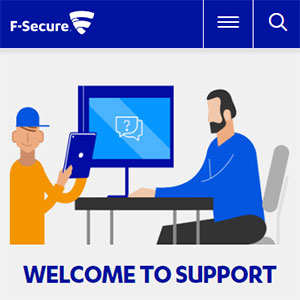
F-Secure has reliable customer support available across several channels. The best option is live chat support, available 24/7. If you want instant feedback, consider live chat.
You can also opt for call support, but you might have to wait a little longer for your call to go through. Other support channels include a help forum, FAQs, installation guides, and a troubleshooting section.
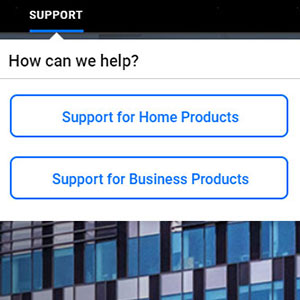
Bitdefender is also reliable when it comes to support courtesy of its multichannel customer support infrastructure.
Here again, the best option is the 24/7 live chat support that offers instant feedback on most basic issues. However, you might wait a few minutes for the agents to liaise with the technical team on some technical aspects.
Besides live chat, Bitdefender VPN has a telephone line and email support, but they are not always reliable. Other support options include support articles, user guides, tutorials, and an FAQ section.
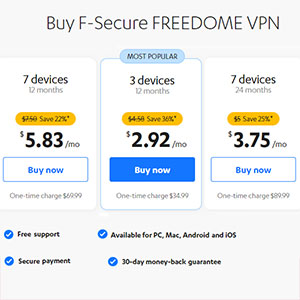
FREEDOME VPN doesn’t have a free version of the software. However, the company offers a free 5-day trial for Windows and Android and a 7-day free trial when you sign up with an iOS device. No credit card is required to get the free trial.
There is also a 30-day money-back guarantee, so in case you don’t like the service, you can ask for a refund. Regarding the paid plans, there are 3 main plans. The difference between these plans is the number of devices you can connect at a go and the duration. There is a 3-device plan starting at £6.99 a month.
You can also customize a plan depending on the license duration and the devices you want to protect. The available payment methods include PayPal, Visa, Mastercard, American Express, JCB, and Wire transfer.
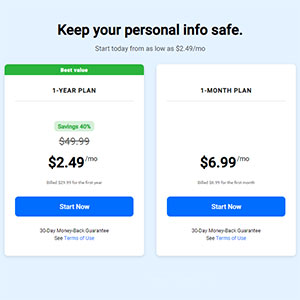
One of the advantages of Bitdefender VPN is the free version. However, it limits bandwidths to 200 MB daily.
There’s also a free trial that offers users all the features for 7 days. Regarding the paid plans, there are 2; a 1-month plan for $6.99 a month billed monthly and a yearly plan for $2.49 a month billed yearly.
A 30-day money-back guarantee covers all the 2 plans, so you can get your money back if you think it’s not the best VPN. The available payment methods include Discover, AMEX, PayPal, Mastercard, Visa, and Wire Transfer.
There you have it, folks, an F-Secure vs. Bitdefender VPN comparison review. To be honest, none of the two VPNs are up to the mark as they have slow speeds, are not reliable for streaming, torrenting, and gaming and have questionable log policies despite being in privacy-friendly jurisdictions.
However, if you have to go for either, we recommend Bitdefender as it has a wider server network and is a little bit faster. Besides, it costs much less and has a free version.